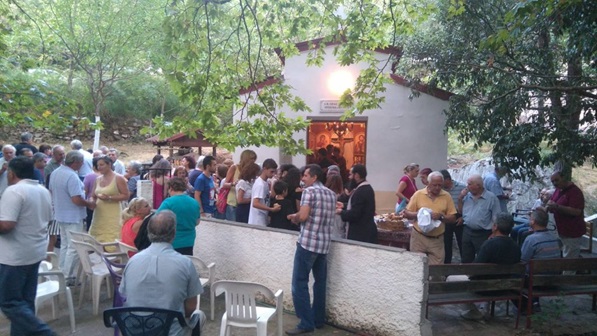Where’s God? When does He speak to us? (Hieromonk Eleftherios Balakos)
2 Σεπτεμβρίου 2016
We look to hear the voice of God in some out of the ordinary event, or through some important personage. But perhaps this is just what suits us. It allows us to retreat into the vagueness of our personal interpretation. In short, it’s what we want and what’s in our own interest. But the Living God isn’t content with abstract ruminations and interpretations and so He makes sure to speak to us through our daily routine. And this routine actually tells us more about the needs of our brothers and sisters than anything else. Any needs at all. Spiritual or material.
I believe that God speaks to us mainly through other people. And we hear Him when we put aside our personal interpretations, and our own truths, our schedules. It’s in the faces of our sisters and brothers that we see the reflection of ‘the vision of God’. It’s as clear as the person standing right in front of you.

My wife met her godmother when she (my wife) was young and she (her godmother, Tatyana Savielievna Lampert) was already very elderly. Tatyana Savielievna was born into a very wealthy Jewish family but converted to Christianity, a fact she kept secret because she didn’t want to enjoy the privileges that would have been hers. She was one of the first women to attend the University of Moscow and was a Communist, as were not a few Christians in Russia before the Revolution. When the Revolution took place, however, and the persecutions began, she immediately declared her faith. She was forced to flee, first to Poland, then Germany (out of the frying pan…!) and finally to France. During World War II she worked as a nurse. One day, she and a priest were visiting an impoverished Russian exile in Paris and the priest asked the man if he would like anything.
‘Chicken and cucumbers’ came the reply, an impossible request given the privations of the time.
‘Very well’, said the priest, ‘we’ll pray’.
Tatyana Savielevna was horrified (I still remember her face as she told us this). ‘I’m not praying for chicken and cucumbers’ she said.
‘Yes, you are. On your knees’.
The next morning, when they again went to visit the man on their rounds, they found a covered plate outside his door, with – chicken and cucumbers. (This story has been told by, among others, the late Metropolitan Anthony Bloom, who was a surgeon in Paris during WWII and knew Tatyana Savielievna well).
On another occasion, about two years ago, I was having a bite to eat in an Irish pub in Bulgaria (the way one does). After I’d finished my meal I still felt hungry so I ordered a hearty Balkan sausage, grilled, with a side salad and fried potatoes. I remember very clearly thinking at the time: ‘What on earth are you doing? You can’t possibly eat all that’. But it seemed the right thing to do. Anyway, it took ages for the sausage to arrive and I became increasingly angry. How long does it take to grill a sausage, for goodness sake? Eventually it arrived, but I was by then in such a bad temper- and no longer hungry- that I told them to pack it up for me to take away. ‘Tomorrow’s breakfast’ I thought. As I was making my way home, I passed a man rummaging in the trash cans. I quickly said ‘Save, Lord, and have mercy on your servant’, and continued on my merry way. After about ten paces, I suddenly realized. The sausage, salad and chips were never meant for me! If the wretched sausage had been grilled quicker, then this man’s path and mine would never have crossed. I turned and handed him the take out and, the most extraordinary thing was, he showed no emotion in accepting it. No eagerness, no gratitude. He looked me in the eyes and was completely calm.
Then last year I was going through the street market opposite our pied-à-terre in Blagoevgrad, when a man shouted ‘Hey’. I looked up and there was a beggar in a wheel-chair. One of his legs had been amputated at the hip. He was pointing at the ground where I’d dropped a 5 leva note (2 something dollars or pounds). I’d already lost it, he’d seen it, so I picked it up and gave it to him. From then on I made a point of giving him something every time a saw him. Then he disappeared for a while. When I next saw him, his other leg had been amputated at the hip. I continue to give to him, but, to be honest, it’s no longer for him. He’s a man of great dignity and I honestly don’t believe he cares how much people give him. It’s for me. When he says to me: ‘God keep you and bless you’, I feel a very lucky man. His name? Angell.
A note by WJL:
If I may I’d like to introduce a personal note to this wonderful text by Fr. Eleftherios.





